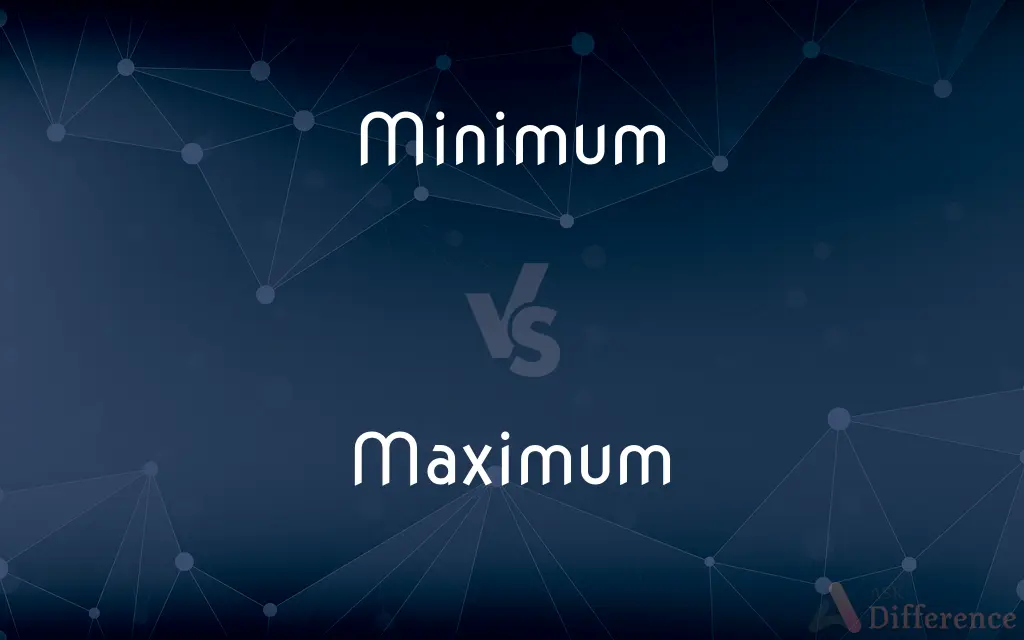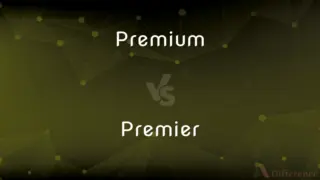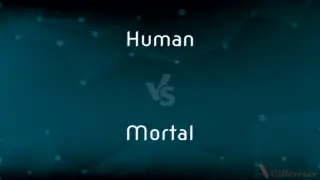Minimum vs. Maximum — What's the Difference?
Edited by Tayyaba Rehman — By Maham Liaqat — Updated on March 24, 2024
Minimum refers to the lowest or smallest amount allowed or possible, whereas maximum signifies the highest or largest amount allowed or possible.

Difference Between Minimum and Maximum
Table of Contents
ADVERTISEMENT
Key Differences
Minimum represents the lowest point, value, or level in a range of possible amounts, emphasizing the least quantity or the smallest degree that is considered acceptable or required. For instance, a minimum balance is the least amount of money required in a bank account. On the other hand, maximum denotes the highest point, value, or level achievable or allowed within a range, highlighting the upper limit of what is possible or permissible, like a maximum speed limit.
While the minimum value is often set to ensure a base level of functionality, safety, or compliance, it acts as a threshold that must be met or exceeded for certain conditions to apply. Conversely, the maximum value serves as a cap or limit, preventing values from exceeding a certain point to avoid potential problems or to maintain control, such as preventing overdrawing in bank accounts or ensuring safety through speed limits.
Minimum and maximum are used in various contexts, from mathematics and science to everyday scenarios like financial transactions and regulatory limits. The minimum can refer to the least amount of resources needed to achieve a task, while the maximum might refer to the highest amount of resources available or allowed for use.
The concept of minimum is critical in scenarios where conserving resources or meeting basic standards is essential, as it helps in managing scarcity or adhering to regulations. In contrast, the concept of maximum is crucial in scenarios where excess needs to be controlled or where there is a risk of surpassing desirable limits, thus ensuring sustainability and safety.
Though both terms set boundaries, their purposes are opposite: minimum values aim to establish a base or starting point, ensuring that nothing falls below a certain standard, whereas maximum values are set to establish an endpoint or ceiling, ensuring that nothing exceeds a predetermined level.
ADVERTISEMENT
Comparison Chart
Definition
The lowest or smallest amount possible or allowed.
The highest or largest amount possible or allowed.
Purpose
To set a lower limit or threshold.
To set an upper limit or cap.
Usage in Context
Ensuring a base level of functionality or compliance.
Preventing excess or maintaining control.
Example
Minimum wage laws ensure workers receive a base level of income.
Maximum capacity signs limit the number of people in a building for safety.
Significance
Indicates the least or lowest acceptable value.
Indicates the most or highest permissible value.
Compare with Definitions
Minimum
Lowest value in a range.
The minimum temperature on record is -20°C.
Maximum
Largest amount permitted.
The maximum occupancy for this room is 50 people.
Minimum
Least possible degree.
He passed the course with the minimum effort.
Maximum
Greatest possible degree.
She worked with maximum efficiency.
Minimum
Smallest amount required.
A minimum of 10 participants is needed to start the class.
Maximum
Highest allowable limit.
The maximum speed limit here is 55 mph.
Minimum
Base level of operation.
This device operates at a minimum temperature of 0°C.
Maximum
Peak level of capacity.
The battery reaches its maximum charge in two hours.
Minimum
Lowest acceptable limit.
The minimum age for voting is 18.
Maximum
Highest value in a range.
The maximum temperature today will be 35°C.
Minimum
The least or smallest amount or quantity possible, attainable, or required
Keep costs to a minimum
They checked visas with the minimum of fuss
Maximum
As great, high, or intense as possible or permitted
The vehicle's maximum speed
A maximum penalty of ten years' imprisonment
Minimum
Smallest or lowest
This can be done with the minimum amount of effort
Maximum
The greatest amount, extent, or intensity possible, permitted, or recorded
Production levels are near their maximum
The school takes a maximum of 32 pupils
Minimum
The least possible quantity or degree.
Maximum
At the most
The table has a length of 4 feet maximum
Minimum
The lowest degree or amount reached or recorded; the lower limit of variation.
Maximum
The greatest possible quantity or degree.
Minimum
A lower limit permitted by law or other authority.
Maximum
The greatest quantity or degree reached or recorded; the upper limit of variation.
Minimum
A sum of money set by a nightclub or restaurant as the least amount each patron must spend on food and drink.
Maximum
The time or period during which the highest point or degree is attained.
Minimum
The smallest number in a finite set of numbers.
Maximum
An upper limit permitted by law or other authority.
Minimum
A value of a function that is less than any other value of the function over a specific interval.
Maximum
The moment when a variable star is most brilliant.
Minimum
Of, consisting of, or representing the lowest possible amount or degree permissible or attainable.
Maximum
The magnitude of the star at such a moment.
Minimum
The lowest limit.
We prefer candidates with a minimum of 4 years experience in the field.
We need a minimum of three staff members on duty at all times.
Maximum
The greatest value assumed by a function over a given interval.
Minimum
The smallest amount.
He always tries to get away with doing the minimum.
Please keep noise to a minimum after 11 o'clock
Maximum
The largest number in a set.
Minimum
(astronomy) A period of minimum brightness or energy intensity (of a star).
The Maunder minimum of the Sun reportedly corresponded to a period of great cold on Earth.
Maximum
Having or being the greatest quantity or the highest degree that has been or can be attained
Maximum temperature.
Minimum
(analysis) A lower bound of a set which is also an element of that set.
Maximum
Of, relating to, or making up a maximum
A maximum number in a series.
Minimum
(statistics) The smallest member of a batch or sample or the lower bound of a probability distribution.
Maximum
The highest limit.
Minimum
To the lowest degree.
Maximum
(mathematics) The greatest value of a set or other mathematical structure, especially the global maximum or a local maximum of a function.
Minimum
The least quantity assignable, admissible, or possible, in a given case; hence, a thing of small consequence; - opposed to maximum.
Maximum
(analysis) An upper bound of a set which is also an element of that set.
Minimum
The smallest possible quantity
Maximum
(statistics) The largest value of a batch or sample or the upper bound of a probability distribution.
Minimum
The point on a curve where the tangent changes from negative on the left to positive on the right
Maximum
(snooker) A 147 break; the highest possible break.
Minimum
The least possible;
Needed to enforce minimal standards
Her grades were minimal
Minimum wage
A minimal charge for the service
Maximum
A score of 180 with three darts.
Maximum
A scoring shot for 6 runs.
Maximum
To the highest degree.
Use the proper dose for the maximum effect.
Maximum
The greatest quantity or value attainable in a given case; or, the greatest value attained by a quantity which first increases and then begins to decrease; the highest point or degree; - opposed to minimum.
Good legislation is the art of conducting a nation to the maximum of happiness, and the minimum of misery.
Maximum
Greatest in quantity or highest in degree attainable or attained; as, a maximum consumption of fuel; maximum pressure; maximum heat.
Maximum
The largest possible quantity
Maximum
The greatest possible degree;
He tried his utmost
Maximum
The point on a curve where the tangent changes from positive on the left to negative on the right
Maximum
The greatest or most complete or best possible;
Maximal expansion
Maximum pressure
Common Curiosities
What defines a minimum value?
The minimum is the lowest or smallest amount possible or permissible in a given context.
How is maximum value used?
Maximum denotes the highest or largest amount that is achievable or allowed.
Can minimum and maximum values change?
Yes, depending on context or regulations, minimum and maximum values can be adjusted.
Is there always a minimum or maximum limit?
In many contexts, yes, to provide guidelines and maintain order or efficiency.
What is the significance of maximum values?
Maximum values prevent excesses, ensuring safety, compliance, and resource management.
What role does maximum capacity play?
It helps in managing resources and preventing hazardous situations.
What happens if minimum standards are not met?
Consequences can include failure, legal penalties, or the inability to proceed.
How do minimum and maximum relate in settings?
They establish lower and upper bounds within which operations or activities must occur.
Why are minimum values important?
Minimum values ensure that standards, requirements, or basic needs are met.
How do minimum and maximum affect decision-making?
They provide clear boundaries that inform or restrict choices and actions.
How do minimum and maximum impact resource allocation?
They guide the distribution and use of resources within set limits.
What are the consequences of exceeding maximum limits?
Overstepping maximum limits can lead to safety risks, inefficiencies, or regulatory penalties.
Why might minimum requirements be set?
To ensure adequacy, safety, and compliance with standards.
Can minimum and maximum values be equal?
Theoretically, yes, in tightly controlled scenarios, but typically they define a range.
Can something have both minimum and maximum values?
Yes, many systems or regulations have both to define acceptable ranges of operation or behavior.
Share Your Discovery

Previous Comparison
Premium vs. Premier
Next Comparison
Human vs. MortalAuthor Spotlight
Written by
Maham LiaqatEdited by
Tayyaba RehmanTayyaba Rehman is a distinguished writer, currently serving as a primary contributor to askdifference.com. As a researcher in semantics and etymology, Tayyaba's passion for the complexity of languages and their distinctions has found a perfect home on the platform. Tayyaba delves into the intricacies of language, distinguishing between commonly confused words and phrases, thereby providing clarity for readers worldwide.













































